

Untitled. Untitled. Untitled. On Wednesday, the Supreme Court will hear oral arguments on the constitutionality of a 15-week abortion ban in Mississippi that provides no exceptions in cases of rape or incest.
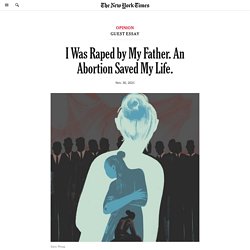
What’s at stake in this case matters to the countless girls and women who have been raped — including those who, like me, were raped by a father, an uncle or another family member. Untitled. In fact, as the second Blackmun memo makes clear, the court that decided Roe saw a direct link between the viability line and a woman’s ability to choose abortion.
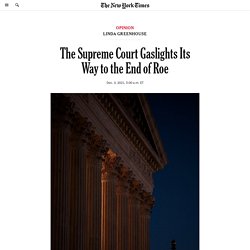
In that second memo, Justice Blackmun referred to the “practical aspect” of the viability line, observing that “there are many pregnant women, particularly younger girls, who may refuse to face the fact of pregnancy and who, for one reason or another, do not get around to medical consultation until the end of the first trimester is upon them or, indeed, has passed.” And then there was Justice Brett Kavanaugh, who rattled off a list of “the most consequential cases in this court’s history” that resulted from overruling prior decisions.
If the court had adhered, for example, to the separate-but-equal doctrine of Plessy v. Ferguson rather than overruling that precedent in Brown v. Board of Education “the country would be a much different place,” he told Ms. Untitled. During the Supreme Court oral arguments on Tuesday in the case of Dobbs v.
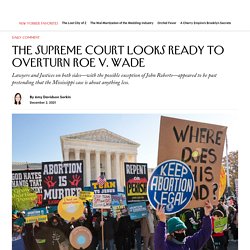
Jackson Women’s Health Organization, involving a Mississippi ban on most abortions after fifteen weeks, Justice Brett Kavanaugh began to rhapsodize about the history-making power the Court has. He began listing major cases—“there’s a string of them”—that, he said, had overturned earlier precedents: Brown v. Board of Education; Baker v. Carr; West Coast Hotel v. Untitled. Untitled. (From left to right) Stacey Newman, Josette Hochman and Jody Serkes participated in a protest in support of reproductive rights earlier this year in St.

Louis. The women all graduated high school before the landmark Roe v. Wade case. Dr. Frederick Joseph Taussig, who taught at Washington University School of Medicine and operated a clinic in the Central West End, traveled to Russia to learn about abortion. Earl and Ann Broden before Earl contract polio and became paralyzed from the neck down. For much of this country’s early history, women aborting a pregnancy was fairly common — even openly advertised — with little to do with morality or laws. It wasn't until 1873 that Congress passed the Comstock Act criminalizing contraception and abortion.
But even then, women continued to seek abortions to end unwanted pregnancies, often resulting in serious injuries or death. It's a history that may soon be revisited. In December, the U.S. The doctor Dr. The wife. Untitled. Cori Bush Abortion. Untitled. The effects having children can have on a woman's career and pay are well documented: While men and women with comparable qualifications and jobs earn similarly at the start of their careers, this changes when women choose to have children, after which their pay takes a hit.
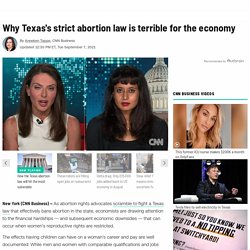
This is often called the "motherhood penalty. " Being denied an abortion causes massive financial distress. And that distress is disproportionately harmful to poorer women and women of color. Critics of the law, which prohibits abortions as early as six weeks, say the measure ignores that people who seek abortions are disproportionately poor and disproportionately people of color. "Many people seeking abortions already face difficult financial circumstances," said Caitlin Myers, professor of economics at Middlebury College. Untitled. The lack of judicial intervention means that the law -- which is one of the strictest in the nation and bans abortion before many people know they are pregnant -- goes into force absent further court intervention.
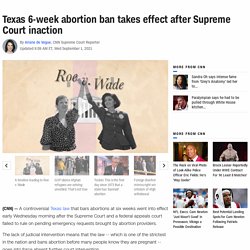
The law allows private citizens to bring civil suits against anyone who assists a pregnant person seeking an abortion in violation of the ban. No other six-week ban has been allowed to go into effect -- even briefly. "What ultimately happens to this law remains to be seen," said CNN Supreme Court analyst and University of Texas Law School professor Steve Vladeck, "but now through their inaction the justices have let the tightest abortion restriction since Roe v. Untitled. That case could be invoked more in the months ahead.
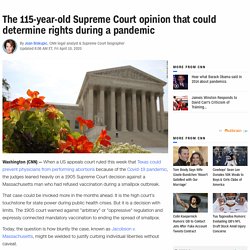
It is the high court's touchstone for state power during public health crises. Republicans, Guns and Abortion. The presidential race has degenerated to the point where I am going to attempt to cheer you up by talking about abortion and guns.

And state legislatures. We do not, as a nation, devote a whole lot of attention to what happens in state capitols, although I personally enjoy those fights about selecting an official rock or state muffin. In recent years, one of the most popular activities in many legislatures has been finding new ways to expand the right to bear arms in places like schools (Utah) or bars (Tennessee) or airports (Georgia).
The other is tromping on reproductive rights. I am telling you all this as a lead-in to a fascinating bill that was recently proposed in the Missouri House of Representatives. Republicans, Guns and Abortion. ArthurLieber (@Lieber4Congress)